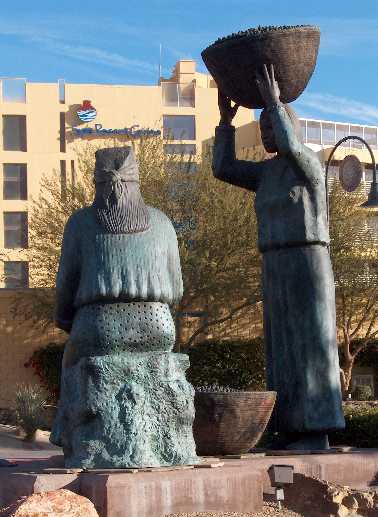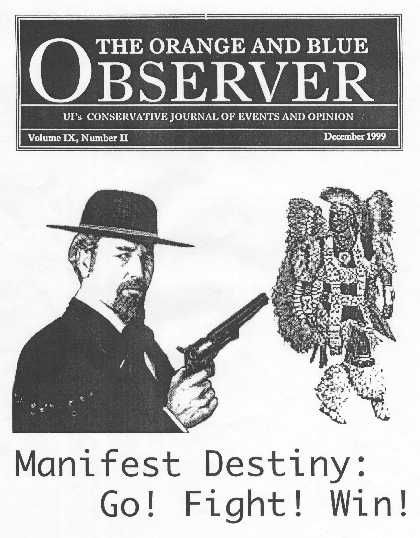 Another Stereotype of the Month entry:
Another Stereotype of the Month entry:
 Another Stereotype of the Month entry:
Another Stereotype of the Month entry:
From the Amador Ledger-Dispatch:
Amador must fight tribal sovereigns
Wednesday, February 02, 2005
- By J. Scully, Ione
My family has lived in Amador County for four generations. I recently attended a meeting of local citizens and was appalled to learn that a proposed casino at Buena Vista was being put on the "fast track" for development.
I was under the erroneous impression that this ridiculous project had been killed a few years ago, when it was discovered that the individuals pushing the project had no legal claim to the land. I was mistaken.
On a parallel note, I have monitored the developments regarding the Plymouth casino in the local papers. I was pleased and impressed with the local populace. They recalled city council members who ignored their wishes and replaced them with individuals who respected the will of the majority. Democracy in action. Surely, I thought this was the death knell of the Plymouth casino and the community could move on. Again, I was mistaken.
At this meeting I learned that both these proposed casino projects are very much alive and being shoved down the throats of Amador County citizens. What I got out of this meeting was that all we, as local citizens, could do was raise issues of the negative impacts that these casinos would create on our lives and property. The tribes could then mitigate these impacts -- if the tribes chose to. If the tribes felt these impacts were not important, our concerns would be ignored. After all, these tribes are a sovereign nation and our laws do not apply to them.
I was pleased to discover that our county government was challenging these tribes in court, but I was not buoyed by their optimism of victory. Earlier that day I had read in the newspaper about several female employees of the Thunder Valley Casino, who all claimed they had been sexually harassed by a supervisor. The women hired an attorney. The casino's response was that they would conduct an internal investigation, however their overall attitude was, "Don't bother with a lawsuit, we are a sovereign nation, untouchable by your laws."
Hardly a day goes by without a newspaper article about a planned casino or misdeeds at an existing casino. There are about 20 communities in California where planned casinos are encroaching on those communities. Every time when local citizens rise to protect their property or assert their rights, the standard answer is, "We are a sovereign nation, there is nothing you can do to stop us."
To my great dismay I have heard attorneys and even some judges regurgitate this "sovereign nation" mantra as they throw up their hands in professional surrender. Our legal community tells us it is the "law of the land" and they are powerless and so are the citizens. The legal community tells us we must helplessly stand by, while "sovereign nations" trample and ignore every law, code or regulation from land use to sexual harassment. Action or mitigation of any kind will happen only if the tribe agrees.
The "sovereign nation" status translates into absolute local power. Absolute power corrupts absolutely.
Are the legal minds right? Are we powerless as citizens or a community to stop this?
The answer is a resounding "NO!" Slavery and poll taxes are just two examples of numerous social horrors that once were the "laws of the land." These laws were changed when Americans decided that change was so imperative that it was worth fighting for. As Americans we are bound by a sacred duty to fight laws which contradict all of our values about equality and our right to decide our own local destiny.
At the meeting I sat next to a local man who is a veteran of the Korean War. While leaving I spoke with another local man, a veteran of Vietnam. Will we reward these men's sacrifices by telling them we stood by, while a "sovereign nation" essentially invaded our community?
These are just two of the multitudes that have answered our nation's call in dangerous times. Many fine people from Amador County have risked all for the cause of equality and democracy, too many have paid very dearly. Our complacency in matters of freedom and equality is a slap in the face, not only to those who fought for it, but to the Founding Fathers and the Constitution itself.
We have no option. We must fight. Our only course of action is for the five districts of Amador County to close together as a fist. The fist of a united Amador County must firmly grasp the sword of free speech and plunge it in the heart of the "sovereign nation" concept until it is dead. Only then can new and fair laws be written.
We must come together and speak as one angry community that will never tolerate any "sovereign nation" or outside money interests that would dictate to us how we develop as a community.
This will not be easy, but if we focus our outrage on the proper state and federal officials and continue to pound them with negative publicity and their blatant disregard of core American values, we can embarrass the politicians. Only then will they change this well-meaning but poorly crafted law.
For the record, I have no problem with the tribes being self-governing. However, these laws have evolved to the extent that they are in effect governing the surrounding communities. The casinos use the limited resources of that community, yet they are not bound to return anything to the community. The present casino costs Amador County taxpayers between $800,000 to $1 million dollars per year in responsive services per county staff.
Casinos mean money, money is power, power breeds arrogance. We must fight this law on all fronts. We must fight it in the community forums, we must fight it in the courts and sadly if our own government ignores us, we must participate in loud, mass demonstrations and marches. We are fighting for our homes.

Rob's reply
J. Scully's main claim seems to be that tribes have "absolute power." That must be news to them.
>> The tribes could then mitigate these impacts -- if the tribes chose to. If the tribes felt these impacts were not important, our concerns would be ignored. After all, these tribes are a sovereign nation and our laws do not apply to them. <<
Wrong. Most federal laws and some state laws apply to tribes. Moreover, tribes have to negotiate a compact with their states before they can proceed with gaming. That compact allows non-Indians to negotiate restrictions on Indian casinos.
>> The casino's response was that they would conduct an internal investigation, however their overall attitude was, "Don't bother with a lawsuit, we are a sovereign nation, untouchable by your laws." <<
If the tribe had their own judicial system, a person could sue in their courts. Some tribes have a judicial system, some tribes don't.
Of course, we don't know whether this "attitude" is something the tribe expressed or something the author imagined. Given Scully's obvious bias, it's probably the latter.
>> Hardly a day goes by without a newspaper article about a planned casino or misdeeds at an existing casino. <<
The vast majority of which are about planned casinos, not misdeeds at casinos. This shouldn't be surprising since Indians have a few hundred casinos either completed or in various stages of construction or expansion.
>> Every time when local citizens rise to protect their property or assert their rights, the standard answer is, "We are a sovereign nation, there is nothing you can do to stop us." <<
I'd love to see this phony "standard answer" quoted somewhere. No, the standard answer is more like, "We will work with the local community to maximize the benefits and minimize the drawbacks of our casino."
>> To my great dismay I have heard attorneys and even some judges regurgitate this "sovereign nation" mantra as they throw up their hands in professional surrender. <<
Why wouldn't they "regurgitate" this "mantra," since it's the law of the land? Apparently Scully is dismayed at his own ignorance of constitutional law. (I assume Scully is a "he.")
>> Our legal community tells us it is the "law of the land" and they are powerless and so are the citizens. <<
More likely the legal community tells you you'll have to work through the standard compacting process set forth in the Indian Gaming Regulatory Act. You can't impose your will on the tribe any more than it can impose its will on you.
>> The legal community tells us we must helplessly stand by, while "sovereign nations" trample and ignore every law, code or regulation from land use to sexual harassment. <<
See above about how tribes are subject to federal and state laws.
Bush, Schwarzenegger, and tribes corrupt?
>> The "sovereign nation" status translates into absolute local power. Absolute power corrupts absolutely. <<
I wonder if Scully opposes President Bush's war on Iraq, or Governor Schwarzenegger's raid on local tax revenues, for this very reason. I'm guessing not.
Tribes don't have absolute power, since they're subject to federal law just like states. In fact, a state government is the best analogy to a tribal government.
Is Scully worried about the "absolute power" of state governments over local concerns? Probably not. Only those brown-skinned Indians seem to scare him.
>> " Slavery and poll taxes are just two examples of numerous social horrors that once were the "laws of the land." These laws were changed when Americans decided that change was so imperative that it was worth fighting for. <<
Yes, you certainly can limit the tribes' power by getting Congress to pass laws. Therefore, quit whining and complaining about how tribes have absolute power and are beyond the democratic process. Neither claim is true.
>> As Americans we are bound by a sacred duty to fight laws which contradict all of our values about equality and our right to decide our own local destiny. <<
The Revolutionary War and the US Constitution weren't about deciding "our own local destiny." They were about forming a union with a representative national government. If Scully thinks the Founders wanted to establish autonomous city-states, he's sadly mistaken.
>> Will we reward these men's sacrifices by telling them we stood by, while a "sovereign nation" essentially invaded our community? <<
Here may be the crux of Scully's problem. Sovereign Indian nations haven't invaded Scully's community. Scully's community has invaded sovereign Indian lands. The Indians were their first, in other words. If Scully doesn't like it, he can move elsewhere.
>> The fist of a united Amador County must firmly grasp the sword of free speech and plunge it in the heart of the "sovereign nation" concept until it is dead. <<
I doubt free speech will be enough to do it. Especially free speech as ill-informed as this essay. Try passing a constitutional amendment overturning almost 200 years of accepted Indian law. That's about the only way to eliminate the "sovereign nation" concept.

>> We must come together and speak as one angry community that will never tolerate any "sovereign nation" or outside money interests that would dictate to us how we develop as a community. <<
The federal and state governments, which are both "sovereign," have far more impact on Scully's community than an Indian nation does. Does Scully plan to plunge a sword into Sacramento or Washington DC?
>> This will not be easy, but if we focus our outrage on the proper state and federal officials and continue to pound them with negative publicity and their blatant disregard of core American values, we can embarrass the politicians. <<
By "core American values," I assume Scully means greed and self-interest. Yes, those have always been core American values ever since the Europeans began decimating the first Indians they met.
>> For the record, I have no problem with the tribes being self-governing. <<
For the record, this statement is a crock. If Scully were really concerned about infringements on the local government, he'd be complaining about federal and state as well as tribal sovereignty.
Tribes govern surrounding communities?
>> However, these laws have evolved to the extent that they are in effect governing the surrounding communities. <<
Every sovereign body affects every other with its laws and actions. Especially its neighbors. If other states use up the Colorado River, for instance, it directly affects the availability of water in California.
That Scully has just discovered that one sovereign affects another is testament to his political blindness. Or he's been aware of the issue all along, but is only now upset because Indians are the ones asserting their sovereignty.
>> Only then will they change this well-meaning but poorly crafted law. <<
Tribal sovereignty is based on almost 200 years of law, not one "well-meaning law." If the Indian Gaming Regulatory Act were to vanish, tribes would still assert their sovereign rights under many other laws.
>> We are fighting for our homes. <<
So are the Indians, and again, they were here first.
Related links
The facts about tribal sovereignty
The facts about Indian gaming
|
. . . |

|
All material © copyright its original owners, except where noted.
Original text and pictures © copyright 2007 by Robert Schmidt.
Copyrighted material is posted under the Fair Use provision of the Copyright Act,
which allows copying for nonprofit educational uses including criticism and commentary.
Comments sent to the publisher become the property of Blue Corn Comics
and may be used in other postings without permission.